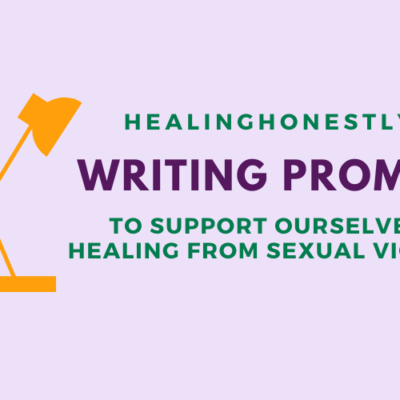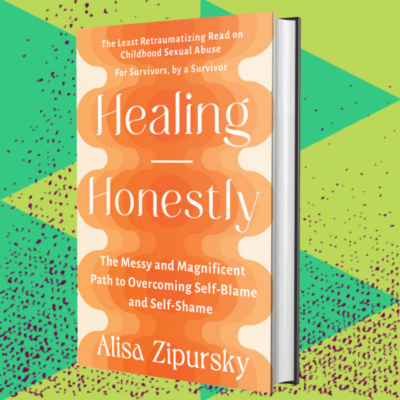This story does not contain any details of sexual violence
Last winter I wrote about some of my favorite strategies for therapeutic writing as a tool to support ourselves in healing from sexual trauma. For the past four years, writing has been an immensely helpful resource for me to better understand myself, my trauma, and what my mind and body are going through. I write for all of you, yes, but first and foremost I write for myself.
Even though I am an extroverted talkative bitch who never met a brick wall I couldn’t muster up some chemistry with, I notice my patterns of thinking and behavior best when I’m writing. If you’ve met me in person, you may think I have no filter, but, believe it or not, I’ve learned that there actually is shit I share in my writing that I wouldn’t say aloud to another human, at least not until after I’ve written it to myself. Writing explains me to myself, and then I take those insights and often use them to explain myself to others (others who deserve it, I don’t just like to explain myself to any inquiring human, to be clear).
For example, my therapist Sandy (what up Sandy!) is often on the receiving end of my writing, which I read aloud to her from my cellphone during our sessions. Often our sessions are based upon something I uncovered or realized while writing.
I want to share with you some of prompts I use to write for myself in therapeutic and supportive way. I do recommend you read this article I wrote first, as it covers some important basics, like steps I take to prevent triggering myself while writing.
If you’re interested in learning more, I facilitate a Writing through Healing Workshop for organizations and campuses, and you can reach out to learn more about that here.
Daily gratitude practices feel both super corny and super helpful in my healing from childhood sexual abuse
2019 was the year of me relying on the structure of daily journals, including the SELF journal and the Panda journal. I have no preferences on these overpriced books of empty paper, but I have learned that having a daily calendar that requires me to write 3 things I’m grateful for, a lesson learned at the end of the day, and an acknowledgment of something I’m proud of from the day, has changed the patterns of thinking in my brain. This may sound super corny, but I get why people push for daily gratitude practice, because it made me pay attention to what actually brought me joy and then I found myself investing more and more into those things.
Here are some basic, perhaps obvious to others, things I learned about myself from a daily gratitude practice: I noticed that on sunny days, even if they’re super cold that I feel way better if I take more time to be outside with Franklin, which gave me the data I needed to force myself outside even if I’m dealing with a bout of depression. I realized that I have to plan for rest for several days after experiencing a trigger, like if I cancel as many things as possible and build time for as much rest as I can that I will recover from it more quickly. I saw time and again that if I set aside a whole day to be with friends and fully let go of my routine that I felt free and happy.
Could I have figured this shit out without a written daily gratitude practice? I mean, probably. But when I saw the same things it in writing, in my own handwriting, over and over again something clicked in my mind and these things I likely knew were true just became so much clearer and it has made my daily decisions easier and easier to make. And I don’t know about you, but when my c-ptsd is triggered my executive functioning goes out the door and it is the most simple decisions that feel so impossible. Those simple decisions have continued to get easier for me.
You super don’t have to buy a fancy journal that asks you everyday to do a gratitude practice like I have, (capitalism is tricky, you know?) you can just type it on your phone or on a post-it or write it on your hand, or anywhere in between.
The writing prompts I use to support myself in my healing
In addition to a daily gratitude practice, below are a list of writing prompts I continue to revisit every time I want to write and am not sure where and how to start. These are the same writing prompts I offer to my students during my Writing through Healing Workshop.
- What am I feeling in my body today?
- What does it feel like to be me today?
- What is something I feel conflicted or confused about today?
- What do I wish other people understood about being me?
- What does healing mean to me?
- What has healing felt like for me this week?
These seemingly simple prompts have inspired some of my most valuable writing that has helped reveal so many important things about myself to myself. I specifically love the prompt about what is something I feel conflicted or confused about. My favorite writing that ultimately turns into writing I want to share with you all almost all stem from that prompt of exploring an idea that I feel really unsure about. I used to think that it would be most valuable for me to write about things that I feel great certainty about, and those do happen, but my favorite writing is actually about the complete opposite. Who knew?
Remember, you are the expert in you
As always, you are the expert in your own life, your safety, and your healing and I encourage you to honor that. Maybe writing is super valuable to you, or maybe it is painting, cooking, gardening or playing music that brings such clarity and support to your life. Maybe writing is really helpful one day, and another day it doesn’t feel right to you. Whatever it is, writing is just one of many tools that exist that may help us at any given time in our healing journey. My wish is for each of us to have so many tools that our toolkits are overflowing with ways to offer ourselves comfort, understanding and love throughout our healing

